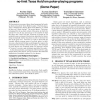1653 search results - page 42 / 331 » Computer science and game theory |
FPLAY
2008
13 years 10 months ago
2008
Conflict theory can be used to explain the interactions between societies during times of turmoil and change (i.e. revolutions, strikes or everyday debates). Games have been produ...
ATAL
2008
Springer
13 years 10 months ago
2008
Springer
We demonstrate two game theory-based programs for headsup limit and no-limit Texas Hold'em poker. The first player, GS3, is designed for playing limit Texas Hold'em, in ...
NPAR
2010
ACM
14 years 1 months ago
2010
ACM
I argue that Non-Photorealistic Rendering (NPR) research will play a key role in the scientific understanding of visual art and illustration. NPR can contribute to scientific un...
CSR
2010
Springer
14 years 1 months ago
2010
Springer
In this paper, we study turn-based quantitative multiplayer non zero-sum games played on finite graphs with reachability objectives. In this framework each player aims at reaching...
CORR
2010
Springer
13 years 9 months ago
2010
Springer
Concurrent reachability games is a class of games heavily studied by the computer science community, in particular by the formal methods community. Two standard algorithms for app...



